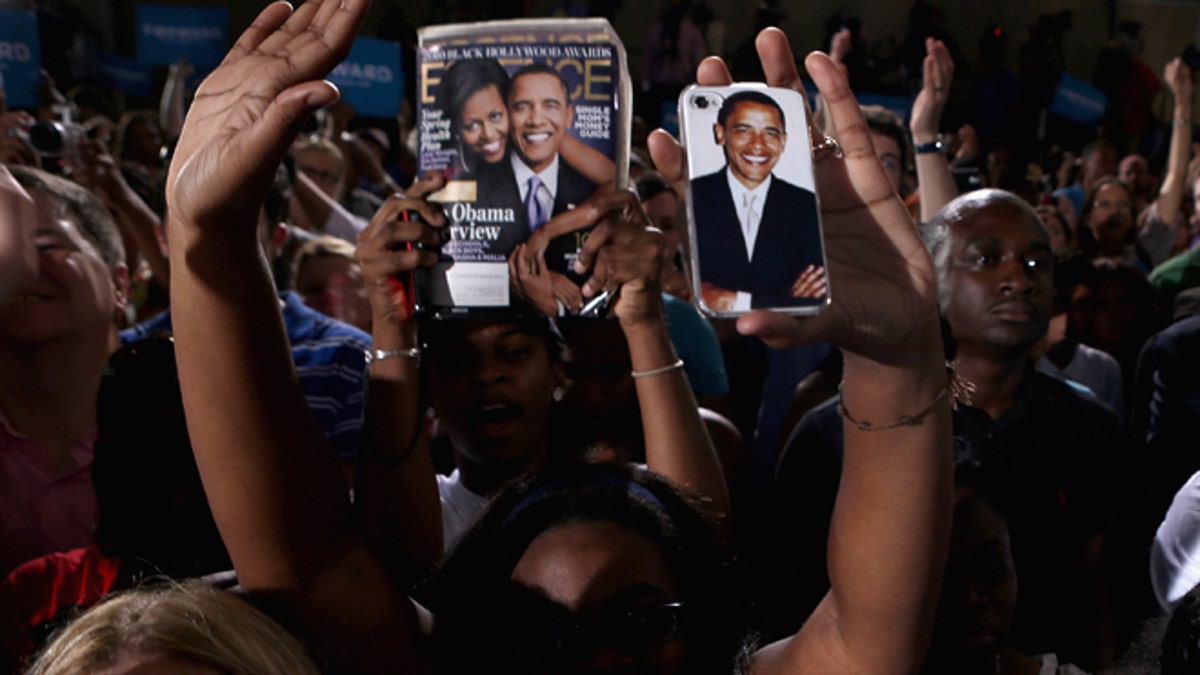
A supporter takes a photograph of U.S. President Barack Obama using an iPhone with an image of the president at a campaign rally at the Kissimmee Civic Center September 8, 2012 in Kissimmee, Florida. (Photo by Chip Somodevilla/Getty Images) (2012 Getty Images)
The federal government’s so-called 'Obama Phones' program, which provides free cellphones to the poor and elderly, is a jobs creator, is “critical” to more than 7 million Latinos from low-income families, and should be expanded rather than cut, the League of United Latin American Citizens (LULAC) is saying.
The Federal Communications Commission's (FCC) Lifeline Assistance program offers a subsidized or free cellphone, not a smartphone, and up to 250 free minutes per month to those who qualify. But opponents point out the $2.2 billion cellphone program is riddled with fraud and inefficiencies, in which free phones easily go to people who don't qualify and those who do qualify have more than one phone.
On a teleconference Wednesday, leaders of LULAC mounted a defense of the program and said cutting it would negatively affect more than 2 million Latino households. To the contrary, they argued, the government should invest in enrolling more Hispanics into the program because they are underrepresented.
More 'Obama phones' means more job opportunities, according to LULAC.
“Allowing a greater number of Hispanics access to wireless Lifeline services could bolster employment rates among those communities,” said Brent A. Wilkes, executive director of LULAC.
Over the last year, however, the program has been under attack by the FCC and Republicans, who point out at the $2.2 billion taxpayer dollars spent on it in 2012 — more than double of the $819 million spent in 2008. There are currently three bills pending in Congress that would seek to stop the Lifeline program.
Though nicknamed after the president, the program was started in 1985 under President Ronald Reagan (applied to land lines for the elderly, at the time) and was expanded to cover cellphone service in 2005 under President George W. Bush.
In its defense of the program, LULAC noted in the teleconference that in January 2012, the FCC overhauled the program by requiring subscribers to recertify by the end of the year. The new and stricter reforms put in place by the FCC dropped the number of people receiving Lifeline from 16.04 million in the fourth quarter of 2012 to 13.4 million as of June 2013. This is a 26 percent decrease from the program's peak enrollment in August 2012, according to the agency.
LULAC argues the new reforms and attacks by Republicans in Congress will keep Latino families and lower income families from being able to compete in a world run by wireless devices.
LULAC used a 2011 study called "Subsidized Cell Phones Provide Significant Economic Gains for Poor and Near Poor Americans" to further back their claims that having a wireless phone can make the difference between getting a job or not.
"My research showed that subsidized cellphones have been an important economic tool, which generates an average of $259 per Lifeline participant per year," said Nicholas P. Sullivan, the author of the study, in a statement.
"If all adults eligible for Lifeline assistance were able to take advantage of the program and earn at the same rate and level as our sample, it would result in $3.7 billion in fresh income for the poor and near poor. By that measure, the program would effectively pay for itself," he added.
Taxpayers pay for the 'Obama Phone' program but no through federal income taxes. Instead, telecommunications companies charge their customers with a universal service fund (USF) fee on their telephone bill. 'Obama Phones' are funded by the Universal Service Administrative Company which was established under the Telecommunications Act of 1996.
